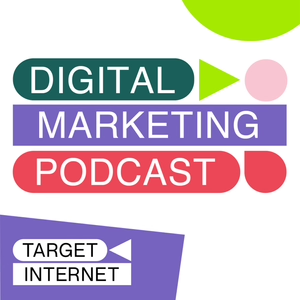
Bonus: What does data-centric marketing really mean?
Explicit content warning
08/23/22 • 33 min
Small business owners often make the mistake of not fully understanding where their marketing dollars are going. This sticky issue has a fancy term: attribution marketing. That is, if you spend x amount of dollars, what’s the true return? Where are the customers coming from? How much do you need to spend for them to find you?
Join me and fellow host, Russell McAthy, on Marketing Unf*cked as we talk through the analytics that can shift the needle in your business and how to identify them. Russell is a marketing attribution expert. We talk about the common pitfalls he sees business of all sizes make when trying to master the data-led approach to marketing.
We’ll dig into how you can dig deep to ask the right questions to improve performance markers, the pitfalls of software like Google Analytics and the metrics you need to measure for success (and the ones to ignore!)
- The truth about what data-led strategic approach really means.
- Why it is important to be data-driven in an actionable way.
- Should you use opinion-based hypotheses or evidence-based decision-making to transform your marketing?
- The 5 whys method - How to ask the right questions to identify how to make your performance better.
- Identifying the levers of change in your business framework isn’t always easy.
- How politics in business can get in the way of your marketing strategy.
- Cost per acquisition vs number of returning customers - which metrics really matter?
- When is your business ready for the mindset change necessary to unf*ck your marketing?
- Google Analytics encourages you to ask the wrong marketing questions.
- How to identify the best program to support your marketing strategy.
- The difference between Google Analytics 3 and Google Analytics 4.
- You need other data resources to build a more holistic portrait of your marketing data.
- How to get the best answers from all advertising platforms. Is machine learning the only answer?
- Statistics on how cost per acquisition changes from new customers to returning customers.
- How to follow through with marketing attribution in the face of the current privacy landscape.
- The “cookieopolis” - do cookies still work?
- The pitfalls of Facebook advertising.
- CPM (cost per mille/impressions) model vs CPC (cost per click) model vs CPA (cost per acquisition) model - which is better?
Small business owners often make the mistake of not fully understanding where their marketing dollars are going. This sticky issue has a fancy term: attribution marketing. That is, if you spend x amount of dollars, what’s the true return? Where are the customers coming from? How much do you need to spend for them to find you?
Join me and fellow host, Russell McAthy, on Marketing Unf*cked as we talk through the analytics that can shift the needle in your business and how to identify them. Russell is a marketing attribution expert. We talk about the common pitfalls he sees business of all sizes make when trying to master the data-led approach to marketing.
We’ll dig into how you can dig deep to ask the right questions to improve performance markers, the pitfalls of software like Google Analytics and the metrics you need to measure for success (and the ones to ignore!)
- The truth about what data-led strategic approach really means.
- Why it is important to be data-driven in an actionable way.
- Should you use opinion-based hypotheses or evidence-based decision-making to transform your marketing?
- The 5 whys method - How to ask the right questions to identify how to make your performance better.
- Identifying the levers of change in your business framework isn’t always easy.
- How politics in business can get in the way of your marketing strategy.
- Cost per acquisition vs number of returning customers - which metrics really matter?
- When is your business ready for the mindset change necessary to unf*ck your marketing?
- Google Analytics encourages you to ask the wrong marketing questions.
- How to identify the best program to support your marketing strategy.
- The difference between Google Analytics 3 and Google Analytics 4.
- You need other data resources to build a more holistic portrait of your marketing data.
- How to get the best answers from all advertising platforms. Is machine learning the only answer?
- Statistics on how cost per acquisition changes from new customers to returning customers.
- How to follow through with marketing attribution in the face of the current privacy landscape.
- The “cookieopolis” - do cookies still work?
- The pitfalls of Facebook advertising.
- CPM (cost per mille/impressions) model vs CPC (cost per click) model vs CPA (cost per acquisition) model - which is better?
Previous Episode

Making an impact: how to weave purpose into profits | Fiona Ras-Jones
From planting trees to fighting hunger, many companies have a cause to champion. But with so much greenwashing and virtue signaling, audiences are (understandably) suspicious. How do you build an authentic purpose into your business in the right way? And can it really help your marketing?
Join me on Marketing Unf*cked as I speak with Fiona Ras-Jones, founder of the Make Impact agency, as we talk about the right ways (and wrong ways) to build a purpose-driven business.
We get into the perils of greenwashing, how to measure the effects of your work, and the many benefits you can find by aligning your purpose with your business — at every possible level.
In this episode:
- Let’s define what a purpose is, and how it impacts your business.
- You have to do integrate your company’s purpose throughout your entire business.
- Why do marketers need to have a purpose in the first place?
- Customers want companies they can believe in, and they are more aware than ever before.
- Why aren’t more marketers working on their purpose?
- Every good purpose aims to solve a clearly defined problem.
- Once you define your purpose, how do you measure its impact?
- What are the prerequisites you need to achieve first?
- When your purpose is aligned with your business, more profit also means more social impact.
- How do you align your purpose with your business when it comes to e-commerce?
- We’re all scared of doing this the wrong way...but it’s a learning process.
- Consider the negative impacts and side effects of your business.
- What are the benefits of the Theory of Change Framework?
- How do we communicate our positive impact to customers?
- Consider the power of a clear, compelling story that conveys your purpose.
- How do we deal with the challenges of greenwashing (and other forms of “washing”)?
- Don’t project perfection, but be honest and realistic about how much impact you can make right now.
Resources:
Fiona on LinkedIn
Make Impact
Theory of Change Framework
Website Carbon Calculator
Next Episode

Let go of assumptions to better understand your customers | Janis Thomas
Marketers often exist within a bubble that messes with their perception of their audience. They build ideas about their customers based on their own desires and preconceived notions about different segments, thinking that older audiences are slow and don’t engage with brands online. That an instant conversion is always a win. And, most dangerously, that everyone looks and acts like them.
This is based on ego, not data, and is totally F*cked. But how do you move away from comfortable ideals and begin to engage with your audience in a way that drives higher lifetime value by embracing their diversity and changing behavior?
Join me, Siobhan Solberg, and my co-host Russell McAthy as we speak to Janis Thomas, Ecommerce Marketing Director of Look Fabulous Forever and ex-Marketing Director at Birchbox, about everything from marketing Playboy to young men to marketing make-up to post-menopausal women.
In this episode:
- Granular customer data that tracks journeys helps businesses attract the right sort of customers that stay long term.
- Content that doesn’t drive instant conversions is still a valuable part of the customer journey and can drive higher retention.
- Businesses should look to shift from the short-term goal of instant conversion to lifetime value. Customers that take more convincing often leave later on.
- Representation and accurate portrayals of real people are key when marketing to underrepresented audiences like post-menopausal women.
- Older audiences may take longer to make decisions and convert but are willing to push through longer page load times.
- While older audiences may have lower expectations of side speed and load time, it is important to give them the best possible experience in return for their loyalty.
- Looking at customer data can help e-commerce marketers avoid the common pitfall of believing their customer looks and acts like them.
- Talk to and listen to customers to get the most valuable behavioral insights via Facebook groups and research.
- Over 65s is one of the fastest growing markets, and their experiences should be invested in rather than only chasing Gen Y and Z.
- Continually learning about marketing and evolving technologies helps marketers understand their customers' journeys better and create consistency.
- There are company-wide benefits of engaging with marketing teams across the business and learning from each other’s work.
- Creating a culture where everyone can submit ideas for optimization invites ideas from people without set assumptions. Mixed ability groups create better results.
- Brands have a duty to support their customers through the difficult periods of life.
- Mentoring is important for women to take the next step up in their careers, and encourage more to consider where a board role may fit in their careers.
- Mentors have just as much to gain from the two-way relationship as mentees.
Resources:
If you like this episode you’ll love
Episode Comments
Generate a badge
Get a badge for your website that links back to this episode
<a href="https://goodpods.com/podcasts/marketing-unfcked-198435/bonus-what-does-data-centric-marketing-really-mean-23253032"> <img src="https://storage.googleapis.com/goodpods-images-bucket/badges/generic-badge-1.svg" alt="listen to bonus: what does data-centric marketing really mean? on goodpods" style="width: 225px" /> </a>
Copy




